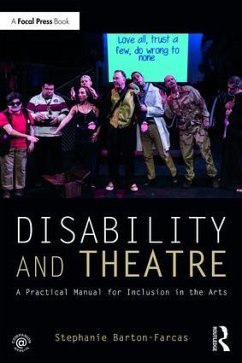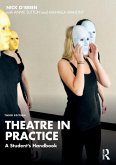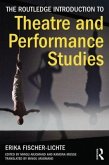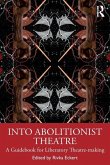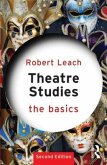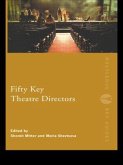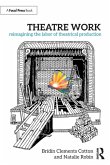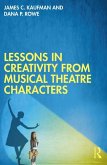- Broschiertes Buch
- Merkliste
- Auf die Merkliste
- Bewerten Bewerten
- Teilen
- Produkt teilen
- Produkterinnerung
- Produkterinnerung
Disability & Theatre: A Practical Manual for Inclusion in the Arts is a step-by step manual on how to create inclusive theatre, including how and where to find actors, how to publicize productions, run rehearsals, act intricate scenes like fights and battles, work with unions, contracts, and agents, and deal with technical issues. This practical information was born from the author¿s 16 years of running the first inclusive theatre company in New York City, and is applicable to any performance level: children¿s theatre, community theatre, regional theatre, touring companies, Broadway, and…mehr
Andere Kunden interessierten sich auch für
![Theatre in Practice Theatre in Practice]() Nick O'Brien (UK The Stanislavski Experience)Theatre in Practice48,99 €
Nick O'Brien (UK The Stanislavski Experience)Theatre in Practice48,99 €![The Routledge Introduction to Theatre and Performance Studies The Routledge Introduction to Theatre and Performance Studies]() Erika Fischer-Lichte (Germany Free University of Berlin)The Routledge Introduction to Theatre and Performance Studies48,99 €
Erika Fischer-Lichte (Germany Free University of Berlin)The Routledge Introduction to Theatre and Performance Studies48,99 €![Into Abolitionist Theatre Into Abolitionist Theatre]() Into Abolitionist Theatre45,99 €
Into Abolitionist Theatre45,99 €![Theatre Studies: The Basics Theatre Studies: The Basics]() Robert LeachTheatre Studies: The Basics25,99 €
Robert LeachTheatre Studies: The Basics25,99 €![Fifty Key Theatre Directors Fifty Key Theatre Directors]() Maria Shevtsova (ed.)Fifty Key Theatre Directors28,99 €
Maria Shevtsova (ed.)Fifty Key Theatre Directors28,99 €![Theatre Work: Reimagining the Labor of Theatrical Production Theatre Work: Reimagining the Labor of Theatrical Production]() Bridin Clements CottonTheatre Work: Reimagining the Labor of Theatrical Production39,99 €
Bridin Clements CottonTheatre Work: Reimagining the Labor of Theatrical Production39,99 €![Lessons in Creativity from Musical Theatre Characters Lessons in Creativity from Musical Theatre Characters]() James C. Kaufman (USA University of Connecticut)Lessons in Creativity from Musical Theatre Characters39,99 €
James C. Kaufman (USA University of Connecticut)Lessons in Creativity from Musical Theatre Characters39,99 €-
-
-
Disability & Theatre: A Practical Manual for Inclusion in the Arts is a step-by step manual on how to create inclusive theatre, including how and where to find actors, how to publicize productions, run rehearsals, act intricate scenes like fights and battles, work with unions, contracts, and agents, and deal with technical issues. This practical information was born from the author¿s 16 years of running the first inclusive theatre company in New York City, and is applicable to any performance level: children¿s theatre, community theatre, regional theatre, touring companies, Broadway, and academic theatre. This book features anecdotal case studies that emphasize problem solving, real-world application, and realistic action plans. A comprehensive companion website provides additional guidelines and hands-on worksheets.
Produktdetails
- Produktdetails
- Verlag: Taylor & Francis Ltd
- Seitenzahl: 210
- Erscheinungstermin: 31. Juli 2017
- Englisch
- Abmessung: 225mm x 150mm x 13mm
- Gewicht: 350g
- ISBN-13: 9781138288973
- ISBN-10: 1138288977
- Artikelnr.: 47870840
- Verlag: Taylor & Francis Ltd
- Seitenzahl: 210
- Erscheinungstermin: 31. Juli 2017
- Englisch
- Abmessung: 225mm x 150mm x 13mm
- Gewicht: 350g
- ISBN-13: 9781138288973
- ISBN-10: 1138288977
- Artikelnr.: 47870840
Stephanie Barton-Farcas is the Artistic Director of Nicüs Spoon Theater Company. Founded in 2001, it is the first company in NYC history to be fully inclusive (age, gender, color, religion, disability, nationality). She is also the cofounder of the Disability Cinema Coalition. She recently directed Richard III with a disabled cast except for the title role and her company Nicüs Spoon is the subject of the documentary Two and Twenty Troubles which follows the production of The Cherry Orchard and four of the disabled actors in it. She has been profiled in The NY Times, Variety, American Theater Magazine and Playbill as a director and advocate. As a writer she has been published in Backstage, Howlround and many other disability or theater publications as well as lecturing and teaching at SAGAFTRA, AEA and many film and theatre industry associations and colleges (Columbia, NYU) in the US and in Europe (CEU in Hungary, University of Riga, University of Kiev, Royal Conservatoire Scotland among others) about inclusion in the arts.
TABLE OF CONTENTS Dedication PREFACE CHAPTER 1: WHY THIS BOOK? CASE STUDY 1: A Seizure on stage. NICU
S SPOON Theater Company, New York City. CHAPTER 2: WHAT IS INCLUSION? A: The most standard misconceptions people have about disability and inclusion and why they are wrong. B: The reasons theaters, college training programs or practitioners are not inclusive. C: The wrong reasons to be inclusive. CASE STUDY 2: Stage Manager in a wheelchair. NICU
S SPOON Theater Company, New York City. CHAPTER 3: VOCABULARY AND PERCEPTION CASE STUDY 3: Disabled artist as villain. NICU
S SPOON Theater Company, New York City. CHAPTER 4: RECRUITING AND FINDING ARTISTS CHAPTER ACTION: Write an audition ad. CASE STUDY 4: DIONYSUS THEATER In Houston, TX. Deborah Nowinski, Artistic Director CHAPTER 5: AUDITIONS AND CALLBACKS CHAPTER ACTION: Make an audition or callback checklist CASE STUDY 5: Can an actor who is deaf speak? NICU
S SPOON Theater Company, New York City. CHAPTER 6: REHEARSALS CASE STUDY 6: Snow White & Richard III, NICU
S SPOON Theater Company, New York City. CHAPTER 7: BLOCKING AND FIGHT SEQUENCES CASE STUDY 7: Think outside the box for accessible sets and non-standard staging. NICU
S SPOON Theater Company, New York City. CHAPTER ACTION: A seven point list of how to proceed to do a cast dance for a period play. CHAPTER 8: COSTUMES, PROPS AND MAKEUP CASE STUDY 8: Opening the Door. PHAMALY Theater, Denver, Colorado CHAPTER 9: TECHNICAL REHEARSALS AND FINAL DRESS CASE STUDY 9: A large disabled and diverse cast in technical rehearsal. NICU
S SPOON Theater Company, New York City. CHAPTER 10: PUBLIC RELATIONS AND MARKETING CASE STUDY 10: PHAMALY Theater Company, Denver, Colorado CHAPTER ACTION: CREATE YOUR PR AND MARKETING PLAN CHAPTER 11: THE PERFORMANCE RUN AND STRIKE CHAPTER ACTION: The strike worklist and delegating. CASE STUDY 11: A blind actor and discovering colors. NICU
S SPOON Theater Company, New York City. CHAPTER 12: TECHNICAL CREW AND TECHNICAL DESIGNS CASE STUDY 12: THAT UPPITY THEATER COMPANY, St. Louis, Missouri. CHAPTER 13: ACADEMIC TRAINING, ASSESSMENT AND SUSTAINABILITY CHAPTER ACTION: How well is your institution doing? CASE STUDY 13: The Glass Menagerie, a personal case study. Christine Bruno. CHAPTER 14: ASSESSMENT AND SUSTAINABILITY IN THEATERS CASE STUDY 14: TBI and mental disabilities. NICU
S SPOON Theater Company, New York City. CHAPTER ACTION: Assess your theater for sustainability. CHAPTER 15: AFTERWORD CASE STUDY 15: GIDEON PRODUCTIONS, New York City. CHAPTER 16: CASE STUDY OUTCOMES BIBLIOGRAPHY AND RESOURCES WEBSITES AS RESOURCES ASSOCIATIONS AND INCLUSIVE THEATER COMPANIES LIST OF PHOTOGRAPHS NOTES ON CONTRIBUTORS GLOSSARY
S SPOON Theater Company, New York City. CHAPTER 2: WHAT IS INCLUSION? A: The most standard misconceptions people have about disability and inclusion and why they are wrong. B: The reasons theaters, college training programs or practitioners are not inclusive. C: The wrong reasons to be inclusive. CASE STUDY 2: Stage Manager in a wheelchair. NICU
S SPOON Theater Company, New York City. CHAPTER 3: VOCABULARY AND PERCEPTION CASE STUDY 3: Disabled artist as villain. NICU
S SPOON Theater Company, New York City. CHAPTER 4: RECRUITING AND FINDING ARTISTS CHAPTER ACTION: Write an audition ad. CASE STUDY 4: DIONYSUS THEATER In Houston, TX. Deborah Nowinski, Artistic Director CHAPTER 5: AUDITIONS AND CALLBACKS CHAPTER ACTION: Make an audition or callback checklist CASE STUDY 5: Can an actor who is deaf speak? NICU
S SPOON Theater Company, New York City. CHAPTER 6: REHEARSALS CASE STUDY 6: Snow White & Richard III, NICU
S SPOON Theater Company, New York City. CHAPTER 7: BLOCKING AND FIGHT SEQUENCES CASE STUDY 7: Think outside the box for accessible sets and non-standard staging. NICU
S SPOON Theater Company, New York City. CHAPTER ACTION: A seven point list of how to proceed to do a cast dance for a period play. CHAPTER 8: COSTUMES, PROPS AND MAKEUP CASE STUDY 8: Opening the Door. PHAMALY Theater, Denver, Colorado CHAPTER 9: TECHNICAL REHEARSALS AND FINAL DRESS CASE STUDY 9: A large disabled and diverse cast in technical rehearsal. NICU
S SPOON Theater Company, New York City. CHAPTER 10: PUBLIC RELATIONS AND MARKETING CASE STUDY 10: PHAMALY Theater Company, Denver, Colorado CHAPTER ACTION: CREATE YOUR PR AND MARKETING PLAN CHAPTER 11: THE PERFORMANCE RUN AND STRIKE CHAPTER ACTION: The strike worklist and delegating. CASE STUDY 11: A blind actor and discovering colors. NICU
S SPOON Theater Company, New York City. CHAPTER 12: TECHNICAL CREW AND TECHNICAL DESIGNS CASE STUDY 12: THAT UPPITY THEATER COMPANY, St. Louis, Missouri. CHAPTER 13: ACADEMIC TRAINING, ASSESSMENT AND SUSTAINABILITY CHAPTER ACTION: How well is your institution doing? CASE STUDY 13: The Glass Menagerie, a personal case study. Christine Bruno. CHAPTER 14: ASSESSMENT AND SUSTAINABILITY IN THEATERS CASE STUDY 14: TBI and mental disabilities. NICU
S SPOON Theater Company, New York City. CHAPTER ACTION: Assess your theater for sustainability. CHAPTER 15: AFTERWORD CASE STUDY 15: GIDEON PRODUCTIONS, New York City. CHAPTER 16: CASE STUDY OUTCOMES BIBLIOGRAPHY AND RESOURCES WEBSITES AS RESOURCES ASSOCIATIONS AND INCLUSIVE THEATER COMPANIES LIST OF PHOTOGRAPHS NOTES ON CONTRIBUTORS GLOSSARY
TABLE OF CONTENTS Dedication PREFACE CHAPTER 1: WHY THIS BOOK? CASE STUDY 1: A Seizure on stage. NICU
S SPOON Theater Company, New York City. CHAPTER 2: WHAT IS INCLUSION? A: The most standard misconceptions people have about disability and inclusion and why they are wrong. B: The reasons theaters, college training programs or practitioners are not inclusive. C: The wrong reasons to be inclusive. CASE STUDY 2: Stage Manager in a wheelchair. NICU
S SPOON Theater Company, New York City. CHAPTER 3: VOCABULARY AND PERCEPTION CASE STUDY 3: Disabled artist as villain. NICU
S SPOON Theater Company, New York City. CHAPTER 4: RECRUITING AND FINDING ARTISTS CHAPTER ACTION: Write an audition ad. CASE STUDY 4: DIONYSUS THEATER In Houston, TX. Deborah Nowinski, Artistic Director CHAPTER 5: AUDITIONS AND CALLBACKS CHAPTER ACTION: Make an audition or callback checklist CASE STUDY 5: Can an actor who is deaf speak? NICU
S SPOON Theater Company, New York City. CHAPTER 6: REHEARSALS CASE STUDY 6: Snow White & Richard III, NICU
S SPOON Theater Company, New York City. CHAPTER 7: BLOCKING AND FIGHT SEQUENCES CASE STUDY 7: Think outside the box for accessible sets and non-standard staging. NICU
S SPOON Theater Company, New York City. CHAPTER ACTION: A seven point list of how to proceed to do a cast dance for a period play. CHAPTER 8: COSTUMES, PROPS AND MAKEUP CASE STUDY 8: Opening the Door. PHAMALY Theater, Denver, Colorado CHAPTER 9: TECHNICAL REHEARSALS AND FINAL DRESS CASE STUDY 9: A large disabled and diverse cast in technical rehearsal. NICU
S SPOON Theater Company, New York City. CHAPTER 10: PUBLIC RELATIONS AND MARKETING CASE STUDY 10: PHAMALY Theater Company, Denver, Colorado CHAPTER ACTION: CREATE YOUR PR AND MARKETING PLAN CHAPTER 11: THE PERFORMANCE RUN AND STRIKE CHAPTER ACTION: The strike worklist and delegating. CASE STUDY 11: A blind actor and discovering colors. NICU
S SPOON Theater Company, New York City. CHAPTER 12: TECHNICAL CREW AND TECHNICAL DESIGNS CASE STUDY 12: THAT UPPITY THEATER COMPANY, St. Louis, Missouri. CHAPTER 13: ACADEMIC TRAINING, ASSESSMENT AND SUSTAINABILITY CHAPTER ACTION: How well is your institution doing? CASE STUDY 13: The Glass Menagerie, a personal case study. Christine Bruno. CHAPTER 14: ASSESSMENT AND SUSTAINABILITY IN THEATERS CASE STUDY 14: TBI and mental disabilities. NICU
S SPOON Theater Company, New York City. CHAPTER ACTION: Assess your theater for sustainability. CHAPTER 15: AFTERWORD CASE STUDY 15: GIDEON PRODUCTIONS, New York City. CHAPTER 16: CASE STUDY OUTCOMES BIBLIOGRAPHY AND RESOURCES WEBSITES AS RESOURCES ASSOCIATIONS AND INCLUSIVE THEATER COMPANIES LIST OF PHOTOGRAPHS NOTES ON CONTRIBUTORS GLOSSARY
S SPOON Theater Company, New York City. CHAPTER 2: WHAT IS INCLUSION? A: The most standard misconceptions people have about disability and inclusion and why they are wrong. B: The reasons theaters, college training programs or practitioners are not inclusive. C: The wrong reasons to be inclusive. CASE STUDY 2: Stage Manager in a wheelchair. NICU
S SPOON Theater Company, New York City. CHAPTER 3: VOCABULARY AND PERCEPTION CASE STUDY 3: Disabled artist as villain. NICU
S SPOON Theater Company, New York City. CHAPTER 4: RECRUITING AND FINDING ARTISTS CHAPTER ACTION: Write an audition ad. CASE STUDY 4: DIONYSUS THEATER In Houston, TX. Deborah Nowinski, Artistic Director CHAPTER 5: AUDITIONS AND CALLBACKS CHAPTER ACTION: Make an audition or callback checklist CASE STUDY 5: Can an actor who is deaf speak? NICU
S SPOON Theater Company, New York City. CHAPTER 6: REHEARSALS CASE STUDY 6: Snow White & Richard III, NICU
S SPOON Theater Company, New York City. CHAPTER 7: BLOCKING AND FIGHT SEQUENCES CASE STUDY 7: Think outside the box for accessible sets and non-standard staging. NICU
S SPOON Theater Company, New York City. CHAPTER ACTION: A seven point list of how to proceed to do a cast dance for a period play. CHAPTER 8: COSTUMES, PROPS AND MAKEUP CASE STUDY 8: Opening the Door. PHAMALY Theater, Denver, Colorado CHAPTER 9: TECHNICAL REHEARSALS AND FINAL DRESS CASE STUDY 9: A large disabled and diverse cast in technical rehearsal. NICU
S SPOON Theater Company, New York City. CHAPTER 10: PUBLIC RELATIONS AND MARKETING CASE STUDY 10: PHAMALY Theater Company, Denver, Colorado CHAPTER ACTION: CREATE YOUR PR AND MARKETING PLAN CHAPTER 11: THE PERFORMANCE RUN AND STRIKE CHAPTER ACTION: The strike worklist and delegating. CASE STUDY 11: A blind actor and discovering colors. NICU
S SPOON Theater Company, New York City. CHAPTER 12: TECHNICAL CREW AND TECHNICAL DESIGNS CASE STUDY 12: THAT UPPITY THEATER COMPANY, St. Louis, Missouri. CHAPTER 13: ACADEMIC TRAINING, ASSESSMENT AND SUSTAINABILITY CHAPTER ACTION: How well is your institution doing? CASE STUDY 13: The Glass Menagerie, a personal case study. Christine Bruno. CHAPTER 14: ASSESSMENT AND SUSTAINABILITY IN THEATERS CASE STUDY 14: TBI and mental disabilities. NICU
S SPOON Theater Company, New York City. CHAPTER ACTION: Assess your theater for sustainability. CHAPTER 15: AFTERWORD CASE STUDY 15: GIDEON PRODUCTIONS, New York City. CHAPTER 16: CASE STUDY OUTCOMES BIBLIOGRAPHY AND RESOURCES WEBSITES AS RESOURCES ASSOCIATIONS AND INCLUSIVE THEATER COMPANIES LIST OF PHOTOGRAPHS NOTES ON CONTRIBUTORS GLOSSARY

